[Deervetch and Trefoils: The Genera Acmispon, Hosackia, and Lotus in the Columbia River
Gorge of Oregon and Washington]
American Bird's-foot Trefoil, Pursh's Lotus, Spanish-clover
Acmispon americanus var. americanus
Synonyms: Hosackia americana, Lotus americanus, Lotus purshiana, Lotus purshianus var. glaber, Lotus purshiana var. purshiana, Lotus unifoliolatus var. unifoliolatus
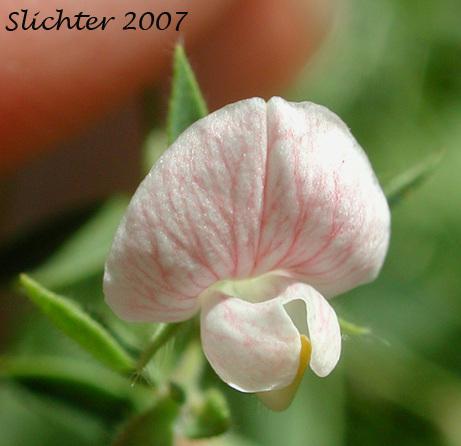
The photo above shows a close-up frontal-view
of the flower of spanish-clover as seen as seen at about 2780' at the edge
of the roadbed of Road K6000 at the southeastern corner of Mt. Adams.
Characteristics:
Spanish-clover is an annual wildflower with spreading to erect
stems from 10-60 cm long. The stems and leaves are typically densely covered
with spreading hairs (See photos.). The stems are simple to commonly branched
from the base. The leaves are alternate along the stems with 3 leaflets (sometimes
4-5) on the lower stems and often single leaflets on the upper stem. The blades
are ovate-lanceolate to oblong-obovate in outline and measure from 6-30 mm long
and 3-10 mm wide. The tips of the leaves range from obtuse to acute. When present,
the two lateral lobes are unsymmetrical at the base.
The peduncles (flower stalk) ranges from 1-25 mm long and usually
bears a leafy bract immediately beneath the single flower. The calyx is is 3-6
mm long with linear teeth measuring about equal to the tube or twice as long.
The calyx is densely covered with spreading hairs. The petals are 4-9 mm long
and cream-colored to rose-colored with white-veins or completely rose-colored.
The fruit is a narrow, linear pod (See photos below.) measuring from 15-35 mm
long and 2-2.5 mm wide. The pod is slightly constricted between the seeds.
Habitat:
Spanish-clover may be found in vernally moist rocky to sandy
soils on open to forested slopes.
Range:
Spanish-clover may be found on both sides of the Cascade Mts.
from British Columbia south to California and Mexico and eastward through Idaho
and Montana to the Great Plains and southward to Arkansas and Texas.
In the Columbia River Gorge it may be found between the elevations
of 100'-2000' from Rooster Rock eastward to Biggs Junction.

Photographed below the summer high water mark along the shores of the Columbia River at Dalton Pt...........September 1, 2007. Note the
numerous long, spreading hairs on the calyx tube and its narrow lobes as well
as the hairs on the leaves.
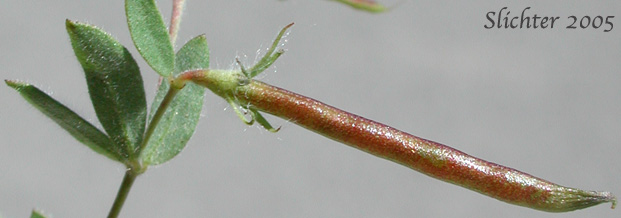
The photo above shows a close-up of the long,
linear pod of spanish-clover as seen along Road #23 at the Mt. Adams Viewpoint
about one-half mile south of Road #8810 at the southwestern corner of Mt. Adams.........August
26, 2005. The pods are typically longer than 15 mm long but less than
3 mm wide and slightly constricted between the seeds (visible above).
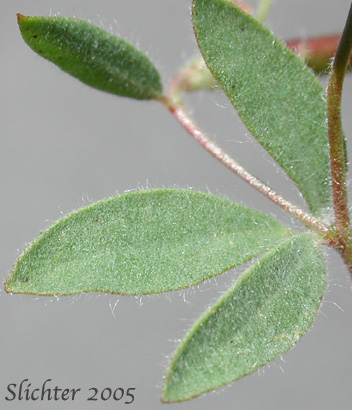
The photo above shows the stem leaves of spanish-clover.
The leaves usually have only 3 leaflets with individual leaflets measuring 3-10
mm wide.
- - 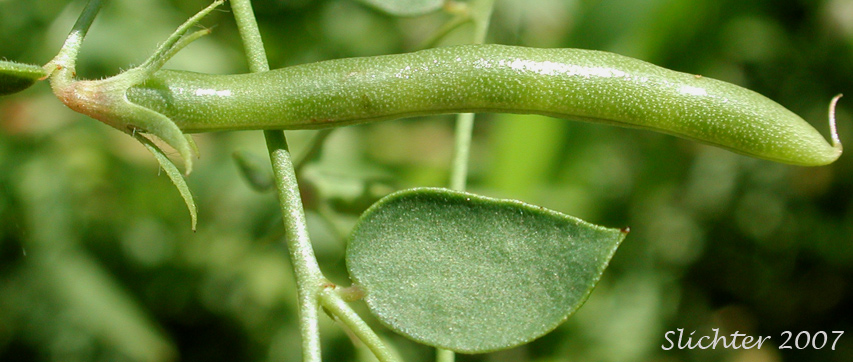
A close-up of the long, narrow seed pod of spanish-clover. Photographed below the summer high water mark along the shores of the Columbia River at Dalton Pt...........September 1, 2007. Click each photo to see a larger version. Note that this species is normally one that blooms in late spring to early summer, but as this location is frequently underwater until late summer, it seems to be in bloom at this location at this time.
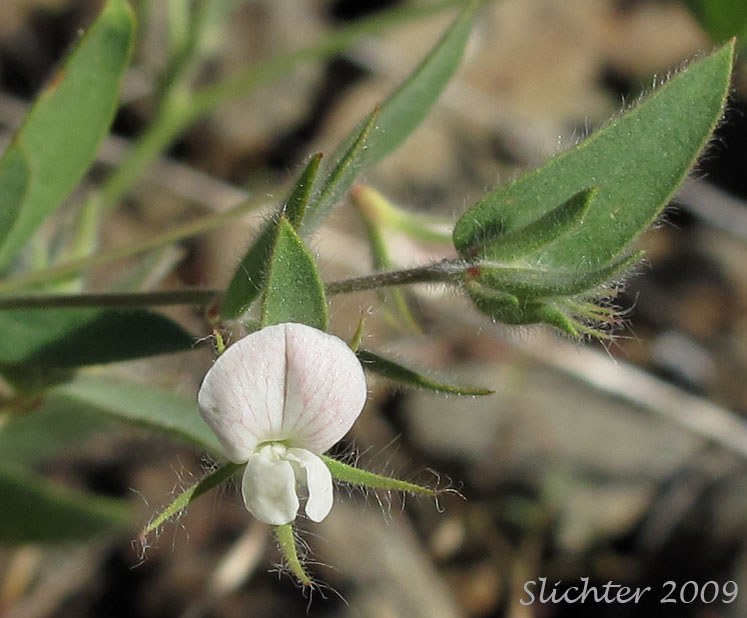 -
- 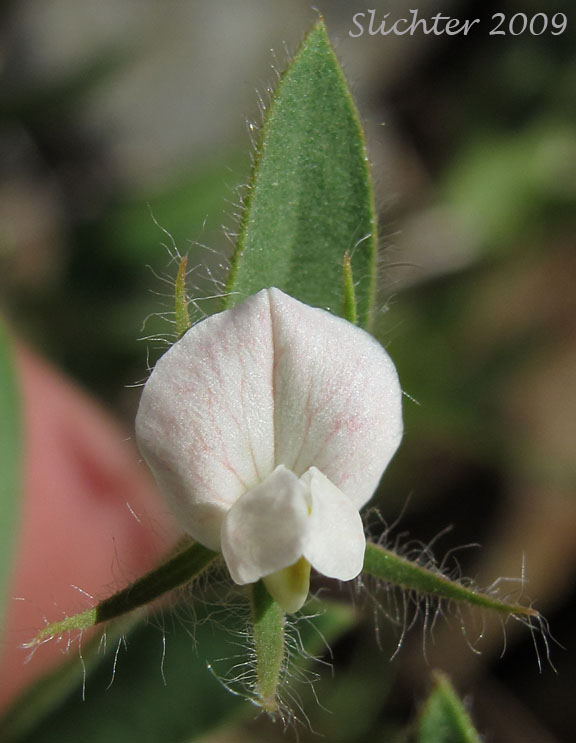
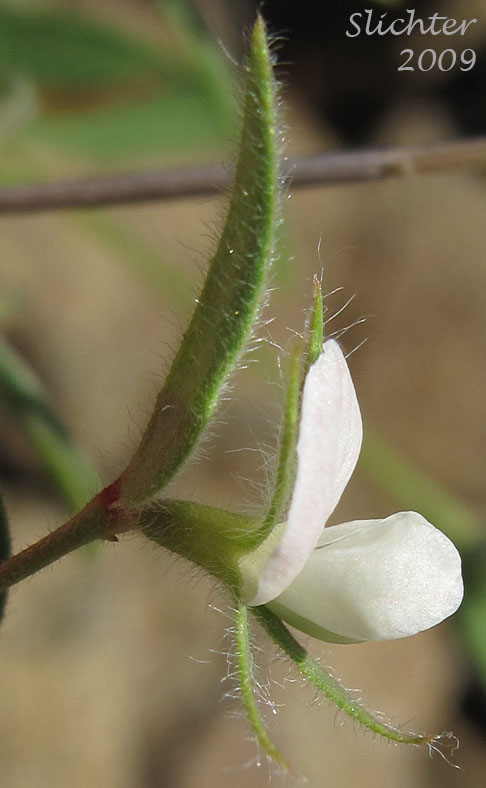 -
- 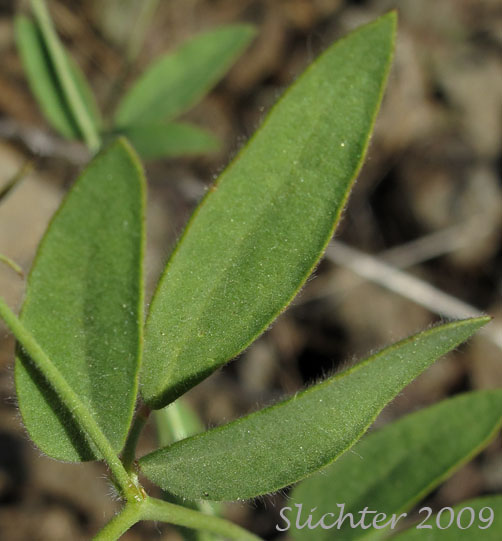
Close-ups of the leaves and flowers of spanish-clover as seen along Soda Springs Road in the Klickitat State Wildlife Area........June 28, 2009.
Paul Slichter